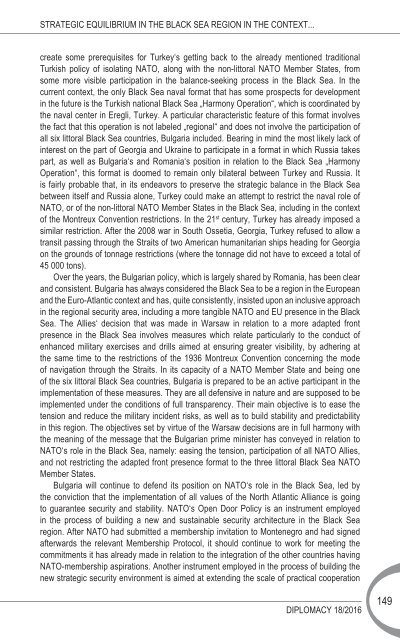DIPLOMACY ДИПЛОМАЦИЯ
2kGfdFv
2kGfdFv
Create successful ePaper yourself
Turn your PDF publications into a flip-book with our unique Google optimized e-Paper software.
STRATEGIC EQUILIBRIUM IN THE BLACK SEA REGION IN THE CONTEXT...<br />
create some prerequisites for Turkey’s getting back to the already mentioned traditional<br />
Turkish policy of isolating NATO, along with the non-littoral NATO Member States, from<br />
some more visible participation in the balance-seeking process in the Black Sea. In the<br />
current context, the only Black Sea naval format that has some prospects for development<br />
in the future is the Turkish national Black Sea “Harmony Operation”, which is coordinated by<br />
the naval center in Eregli, Turkey. A particular characteristic feature of this format involves<br />
the fact that this operation is not labeled “regional” and does not involve the participation of<br />
all six littoral Black Sea countries, Bulgaria included. Bearing in mind the most likely lack of<br />
interest on the part of Georgia and Ukraine to participate in a format in which Russia takes<br />
part, as well as Bulgaria’s and Romania’s position in relation to the Black Sea “Harmony<br />
Operation”, this format is doomed to remain only bilateral between Turkey and Russia. It<br />
is fairly probable that, in its endeavors to preserve the strategic balance in the Black Sea<br />
between itself and Russia alone, Turkey could make an attempt to restrict the naval role of<br />
NATO, or of the non-littoral NATO Member States in the Black Sea, including in the context<br />
of the Montreux Convention restrictions. In the 21 st century, Turkey has already imposed a<br />
similar restriction. After the 2008 war in South Ossetia, Georgia, Turkey refused to allow a<br />
transit passing through the Straits of two American humanitarian ships heading for Georgia<br />
on the grounds of tonnage restrictions (where the tonnage did not have to exceed a total of<br />
45 000 tons).<br />
Over the years, the Bulgarian policy, which is largely shared by Romania, has been clear<br />
and consistent. Bulgaria has always considered the Black Sea to be a region in the European<br />
and the Euro-Atlantic context and has, quite consistently, insisted upon an inclusive approach<br />
in the regional security area, including a more tangible NATO and EU presence in the Black<br />
Sea. The Allies’ decision that was made in Warsaw in relation to a more adapted front<br />
presence in the Black Sea involves measures which relate particularly to the conduct of<br />
enhanced military exercises and drills aimed at ensuring greater visibility, by adhering at<br />
the same time to the restrictions of the 1936 Montreux Convention concerning the mode<br />
of navigation through the Straits. In its capacity of a NATO Member State and being one<br />
of the six littoral Black Sea countries, Bulgaria is prepared to be an active participant in the<br />
implementation of these measures. They are all defensive in nature and are supposed to be<br />
implemented under the conditions of full transparency. Their main objective is to ease the<br />
tension and reduce the military incident risks, as well as to build stability and predictability<br />
in this region. The objectives set by virtue of the Warsaw decisions are in full harmony with<br />
the meaning of the message that the Bulgarian prime minister has conveyed in relation to<br />
NATO’s role in the Black Sea, namely: easing the tension, participation of all NATO Allies,<br />
and not restricting the adapted front presence format to the three littoral Black Sea NATO<br />
Member States.<br />
Bulgaria will continue to defend its position on NATO’s role in the Black Sea, led by<br />
the conviction that the implementation of all values of the North Atlantic Alliance is going<br />
to guarantee security and stability. NATO’s Open Door Policy is an instrument employed<br />
in the process of building a new and sustainable security architecture in the Black Sea<br />
region. After NATO had submitted a membership invitation to Montenegro and had signed<br />
afterwards the relevant Membership Protocol, it should continue to work for meeting the<br />
commitments it has already made in relation to the integration of the other countries having<br />
NATO-membership aspirations. Another instrument employed in the process of building the<br />
new strategic security environment is aimed at extending the scale of practical cooperation<br />
<strong>DIPLOMACY</strong> 18/2016<br />
149


